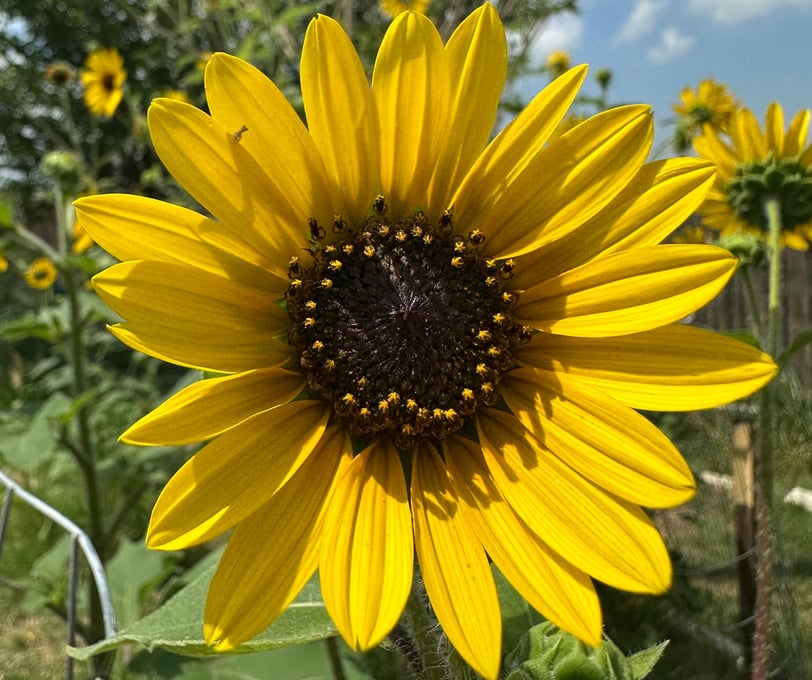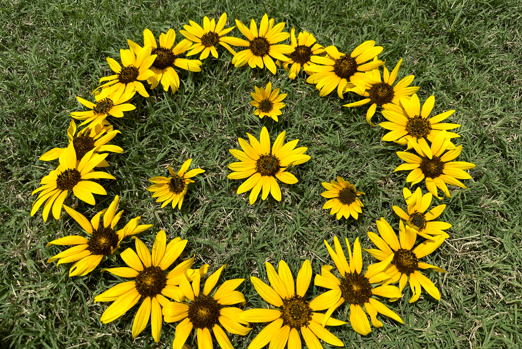Sunflowers Have Superpowers
The incredible uses of sunflowers as a garden companion and different ways to harvest their superpowers.
REGENERATIVE PRACTICESHOMESTEADINGPLANTS
Kylie Treekin
6/22/20253 min read


In the hill country and in yards across Central Texas, the sunflower has become an expected summer sight for people who live here. With its beautiful, striking gold petals and plants that can grow over the tops of fences, it's sure to have stopped you in your tracks at some point during the season. We know these plants well, but why are they growing here, and why do farmers and gardeners plant them?
Sunflowers are beautiful & abundant!
They are great, multifunctional host plants!
So....What's a host plants?
Host plants are usually native plants that bugs in the area are attracted to and grow in conjunction with the seasonal bug populations' egg cycles. Due to their size, sunflowers make a great shady place, especially in the height of summer heat when other plants have died off. Many wasps call this plant home because for them, it's like living in a grocery store with direct access to their food supply. Ants are even attracted to sunflowers and will farm the sap and aphid colonies here. Ants get their water from aphids when there has been no rain, and will actively farm and care for the aphids. If you don't have a host plant, this farming happens on your landscaping plants or food crops.
So what kinda of critters do Sunflowers attract?
Beneficial Helpers
Bees- help pollinate crops
Wasps - eat pest bugs
Ladybugs- eat aphids & pest larva
Birds- help keep other bug populations down
Pests
Stink Bugs- all kinds
Wheel Bugs- carry Chagas disease, which is harmful to humans & dogs
Weevils- all kinds
Ants- who in turn farm aphids
Beetles- wide range of beetle species that eat plants
With all these beneficial bugs coming to the area, one of the biggest pest population destroyers is actually the wild birds. There have been several studies, like this one from the University of Florida, indicating that birds in the garden or on the farm substantially cut populations and is an effective method of pest control. The birds not only eat parts of the sunflowers, but they also perch there and use them for safety while hunting. It's a great relationship for all parties involved! I can say from my own experience that I've definitely seen a decrease in bug populations by having more wild birds around the house.
Not only are sunflowers great host plants or trap crops, but they’re also great companion plants. Companion plants are those that support each other through structure, nutrients, pest repellent, or beneficial bug attraction. Since they grow so big, tall, and strong, many vining plants can use them for support. Squash, cucumbers, nasturtiums, beans, and tomatoes all do really well grown with sunflowers as their support. Even if plants don’t specifically grow well with sunflowers, I always recommend growing them somewhere on your property so they can be a trap crop to capture bugs instead of your prized food crops or landscaping plants.
A trap crop is a plant you specifically place in your growing field so that bad bugs flock to it, preventing overpopulation on other, more vulnerable plants in season.


But wait, there's more! Sunflowers also clean the soil?!
Another massive benefit to growing sunflowers is their soil-cleansing power. Sunflowers have the amazing ability to pull contaminants out of the soil, a process known as “phytoremediation.” This term is defined as a process that uses plants to remove, stabilize, transfer or destroy contaminants in the soil, water or air. How cool that such a beautiful flower has the capability to help restore soil! Read more about it in the Farmer’s Almanac blog. If and when you use sunflowers as a cleaning agent, make sure to cut the above-ground parts after it’s finished flowering and dispose of them (throw them away) or burn them. Be careful of burning plant matter when there is a known history of heavy contaminants; you do not want to breathe in that smoke.
Sunflowers help you grow more! Whether you are trying to grow food, clean the soil, or add plant and bug diversity to your space, sunflowers are a strong and extremely willing supporter who will make it through the hot months in our high Texas heat.
Is this true for all sunflower varieties?
While this is true for most sunflower varieties, the best ones will always be varieties that are local and native to your area. Why? Because they will naturally do better in your environment. There are so many different varieties of sunflower cultivated over time that some of them have specialties, like having bigger seeds for eating, having tender heads for grilling, or some hybrids that are specifically short to fit in smaller areas. There's also every color sunflower you can think of. Be careful of hyperpigmented hybrids, as with other hybrids, they have less nectar availability for pollinators and hummingbirds.
